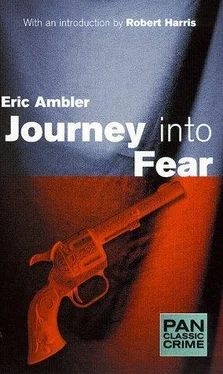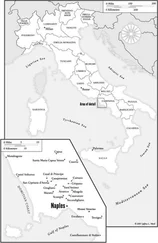Eric Ambler - Journey Into Fear
Здесь есть возможность читать онлайн «Eric Ambler - Journey Into Fear» весь текст электронной книги совершенно бесплатно (целиком полную версию без сокращений). В некоторых случаях можно слушать аудио, скачать через торрент в формате fb2 и присутствует краткое содержание. Год выпуска: 1940, ISBN: 1940, Издательство: Knopf, Жанр: Шпионский детектив, на английском языке. Описание произведения, (предисловие) а так же отзывы посетителей доступны на портале библиотеки ЛибКат.
- Название:Journey Into Fear
- Автор:
- Издательство:Knopf
- Жанр:
- Год:1940
- ISBN:9780307949967
- Рейтинг книги:5 / 5. Голосов: 1
-
Избранное:Добавить в избранное
- Отзывы:
-
Ваша оценка:
- 100
- 1
- 2
- 3
- 4
- 5
Journey Into Fear: краткое содержание, описание и аннотация
Предлагаем к чтению аннотацию, описание, краткое содержание или предисловие (зависит от того, что написал сам автор книги «Journey Into Fear»). Если вы не нашли необходимую информацию о книге — напишите в комментариях, мы постараемся отыскать её.
Journey Into Fear — читать онлайн бесплатно полную книгу (весь текст) целиком
Ниже представлен текст книги, разбитый по страницам. Система сохранения места последней прочитанной страницы, позволяет с удобством читать онлайн бесплатно книгу «Journey Into Fear», без необходимости каждый раз заново искать на чём Вы остановились. Поставьте закладку, и сможете в любой момент перейти на страницу, на которой закончили чтение.
Интервал:
Закладка:
“We danced with an Arab girl named Maria, and saw the cabaret.”
“We? Was there, then, only one girl between you?”
“I was rather tired, and did not want to dance much. Later we had a drink with one of the cabaret dancers, Josette, in her dressing-room.” To Graham it all sounded rather like the evidence of detectives in a divorce case.
“A nice girl, this Josette?”
“Very attractive.”
The Colonel laughed: the doctor keeping the patient’s spirits up. “Blonde or brunette?”
“Blonde.”
“Ah! I must visit Le Jockey. I have missed something. And what happened then?”
“Kopeikin and I left the place. We walked back to the Adler-Palace together where Kopeikin left me to go on to his apartment.”
The Colonel looked humorously astonished. “You left this dancing blonde?”-he snapped his fingers-“just like that? There were no-little games?”
“No. No little games.”
“Ah, but you have told me that you were tired.” He swung round suddenly in his chair to face Kopeikin. “These women-this Arab and this Josette-what do you know of them?”
Kopeikin stroked his chin. “I know Serge, the proprietor of Le Jockey Cabaret. He introduced me to Josette some time ago. She is a Hungarian, I believe. I know nothing against her. The Arab girl is from a house in Alexandria.”
“Very well. We will see about them later.” He turned again to Graham. “Now, Mr. Graham, we shall see what we can find out from you about the enemy. You were tired, you say?”
“Yes.”
“But you kept your eyes open, eh?”
“I suppose so.”
“Let us hope so. You realise that you must have been followed from the moment you left Gallipoli?”
“I hadn’t realised that.”
“It must be so. They knew your hotel and your room in it. They were waiting for you to return. They must have known of every movement you made since you arrived.”
He got up suddenly and, going to a filing cabinet in the corner, extracted from it a yellow manillla folder. He brought it back and dropped it on the desk in front of Graham. “Inside that folder, Mr. Graham, you will find photographs of fifteen men. Some of the photographs are clear; most are very blurred and indistinct. You will have to do the best you can. I want you to cast your mind back to the time you boarded the train at Gallipoli yesterday, and remember every face you saw, even casually, between that time and three o’clock this morning. Then I want you to look at those photographs and see if you recognise any of the faces there. Afterwards Mr. Kopeikin can look at them, but I wish you to see them first.”
Graham opened the folder. There was a series of thin white cards in it. Each was about the size of the folder, and had a photograph gummed to the top half of it. The prints were all the same size, but they had obviously been copied from original photographs of varying sizes. One was an enlargement of part of a photograph of a group of men standing in front of some trees. Underneath each print was a paragraph or two of typewritten matter in Turkish: presumably the description of the man in question.
Most of the photographs were, as the Colonel had said, blurred. One or two of the faces were, indeed, no more than blobs of grey with dark patches marking the eyes and mouths. Those that were clear looked like prison photographs. The men in them stared sullenly at their tormentors. There was one of a negro wearing a tar-boosh with his mouth wide open as if he were shouting at someone to the right of the camera. Graham turned the cards over, slowly and hopelessly. If he had ever seen any of these men in his life, he could not recognise them now.
The next moment his heart jolted violently. He was looking at a photograph taken in very strong sunshine of a man in a hard straw hat standing in front of what might have been a shop, and looking over his shoulder at the camera. His right arm and his body below the waist were out of the picture, and what was in was rather out of focus; in addition the photograph looked as if it had been taken at least ten years previously; but there was no mistaking the doughy, characterless features, the long-suffering mouth, the small deep-set eyes. It was the man in the crumpled suit.
“Well, Mr. Graham!”
“This man. He was at Le Jockey Cabaret. It was the Arab girl who drew my attention to him while we were dancing. She said that he came in just after Kopeikin and me, and that he kept looking at me. She warned me against him. She seemed to think that he might stick a knife in my back and take my wallet.”
“Did she know him?”
“No. She said that she recognised the type.”
Colonel Haki took the card and leaned back. “That was very intelligent of her. Did you see this man, Mr. Kopeikin?”
Kopeikin looked, and then shook his head.
“Very well.” Colonel Haki dropped the card on the desk in front of him. “You need not trouble to look at any more of the photographs, gentlemen. I know now what I wanted to know. This is the only one of the fifteen that interests us. The rest I put with it merely to make sure that you identified this one of your own accord.”
“Who is he?”
“He is a Roumanian by birth. His name is supposed to be Petre Banat; but as Banat is the name of a Roumanian province, I think it very probable that he never had a family name. We know, indeed, very little about him. But what we do know is enough. He is a professional gunman. Ten years ago he was convicted, in Jassy, of helping to kick a man to death, and was sent to prison for two years. Soon after he came out of prison he joined Codreanu’s Iron Guard. In nineteen thirty-three he was charged with the assassination of a police official at Bucova. It appears that he walked into the official’s house one Sunday afternoon, shot the man dead, wounded his wife, and then calmly walked out again. He is a careful man, but he knew that he was safe. The trial was a farce. The court-room was filled with Iron Guards with pistols, who threatened to shoot the judge and everyone connected with the trial if Banat were convicted. He was acquitted. There were many such trials in Roumania at that time. Banat was afterwards responsible for at least four other murders in Roumania. When the Iron Guard was proscribed, however, he escaped from the country, and has not returned there. He spent some time in France until the French police deported him. Then he went to Belgrade. But he got into trouble there, too, and has since moved about Eastern Europe.
“There are men who are natural killers. Banat is one of them. He is very fond of gambling, and is always short of money. At one time it was said that his price for killing a man was as little as five thousand French francs and expenses.
“But all that is of no interest to you, Mr. Graham. The point is that Banat is here in Istanbul. I may tell you that we receive regular reports on the activities of this man Moeller in Sofia. About a week ago it was reported that he had been in touch with Banat, and that Banat had afterwards left Sofia. I will admit to you, Mr. Graham, that I did not attach any importance to the fact. To be frank, it was another aspect of this agent’s activities which was interesting me at the time. It was not until Mr. Kopeikin telephoned me that I remembered Banat and wondered if, by any chance, he had come to Istanbul. We know now that he is here. We know also that Moeller saw him just after those other arrangements for killing you had been upset. There can be no doubt, I think, that it was Banat who was waiting for you in your room at the Adler-Palace.”
Graham strove to seem unimpressed. “He looked harmless enough.”
“That,” said Colonel Haki, sagely, “is because you are not experienced, Mr. Graham. The real killer is not a mere brute. He may be quite sensitive. Have you studied abnormal psychology?”
Читать дальшеИнтервал:
Закладка:
Похожие книги на «Journey Into Fear»
Представляем Вашему вниманию похожие книги на «Journey Into Fear» списком для выбора. Мы отобрали схожую по названию и смыслу литературу в надежде предоставить читателям больше вариантов отыскать новые, интересные, ещё непрочитанные произведения.
Обсуждение, отзывы о книге «Journey Into Fear» и просто собственные мнения читателей. Оставьте ваши комментарии, напишите, что Вы думаете о произведении, его смысле или главных героях. Укажите что конкретно понравилось, а что нет, и почему Вы так считаете.












